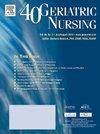Dementia advance care planning perspectives within an Alabama community: A theory guided qualitative study
IF 2.4
3区 医学
Q3 GERIATRICS & GERONTOLOGY
引用次数: 0
Abstract
Advance Care Planning (ACP) is a process that supports decision-making about end-of-life goals. Dementia ACP is recommended during the early stages of the disease to empower the individual living with dementia to express wishes for quality of life before experiencing significant cognitive decline. ACP during early dementia is rare, and hesitancy to initiate difficult and emotional conversations may be a contributing factor to delaying ACP. Effective ACP includes input from the clinician, patient, and family; however, there is limited dementia ACP research that includes all three perspectives. This secondary qualitative data analysis, guided by Social Cognitive Theory, aims to better understand the convergent and divergent views of ACP among dementia clinicians, caregivers, and individuals living with pre-clinical dementia. Study findings support the need for early, frequent, compassionate, and patient-centered ACP conversations that are considerate of the interests, perspectives, and wishes of the individual with dementia and their caregiver.
在阿拉巴马州社区痴呆症提前护理规划的观点:一个理论指导定性研究。
预先护理计划(ACP)是一个支持关于临终目标决策的过程。痴呆ACP建议在疾病的早期阶段,使痴呆症患者能够在经历显著的认知衰退之前表达对生活质量的愿望。早期痴呆期间的ACP是罕见的,对发起困难和情感对话的犹豫可能是延迟ACP的一个因素。有效的ACP包括来自临床医生、患者和家属的意见;然而,包括这三种观点的痴呆ACP研究有限。这项以社会认知理论为指导的二次定性数据分析,旨在更好地理解痴呆临床医生、护理人员和临床前痴呆患者对ACP的看法的趋同和分歧。研究结果支持早期、频繁、富有同情心和以患者为中心的ACP对话的必要性,这些对话应考虑到痴呆症患者及其护理人员的兴趣、观点和愿望。
本文章由计算机程序翻译,如有差异,请以英文原文为准。
求助全文
约1分钟内获得全文
求助全文
来源期刊

Geriatric Nursing
医学-护理
CiteScore
3.80
自引率
7.40%
发文量
257
审稿时长
>12 weeks
期刊介绍:
Geriatric Nursing is a comprehensive source for clinical information and management advice relating to the care of older adults. The journal''s peer-reviewed articles report the latest developments in the management of acute and chronic disorders and provide practical advice on care of older adults across the long term continuum. Geriatric Nursing addresses current issues related to drugs, advance directives, staff development and management, legal issues, client and caregiver education, infection control, and other topics. The journal is written specifically for nurses and nurse practitioners who work with older adults in any care setting.
 求助内容:
求助内容: 应助结果提醒方式:
应助结果提醒方式:


